Questions answered-How Do You Split Your Time?
I’m finding it hard to find enough hours and energy in the days to focus on my day job and devote enough time to real woodworking. I try to write and draw as well, in my sketch book.
I was wondering if you could give me some guidance as to how you go about splitting your time between family, work and others that need time. How do you find balance in this increasingly unbalanced world.Any insight would be so appreciated.
All the hard work you as your team do, I am truly great full.
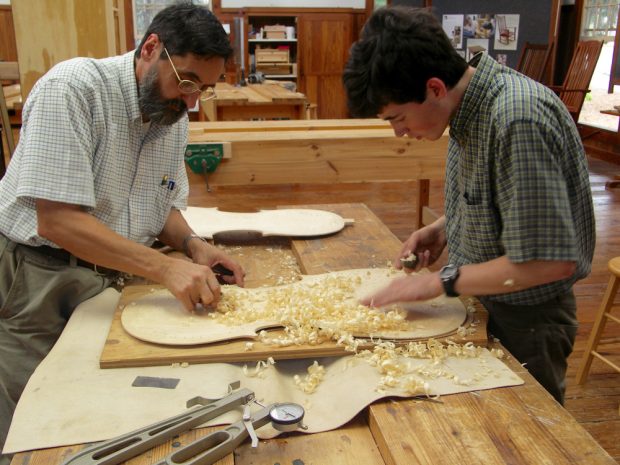
Answer:
Truth is I am not so sure you should. It takes a paradigm shift in the way we think, the way we engage with others and then engage in the so-called post-modern world at large too. I am not really a historian at all although I find history surrounding craft skills and artisanry fascinating. The heart of industrialism was always to reduce skilled workmanship to the lowest common denominator so that instead of training individual crafting artisans to know the full breadth of a craft the work of whole artisanry was parcelled out and led to the production line assemblies we know today.
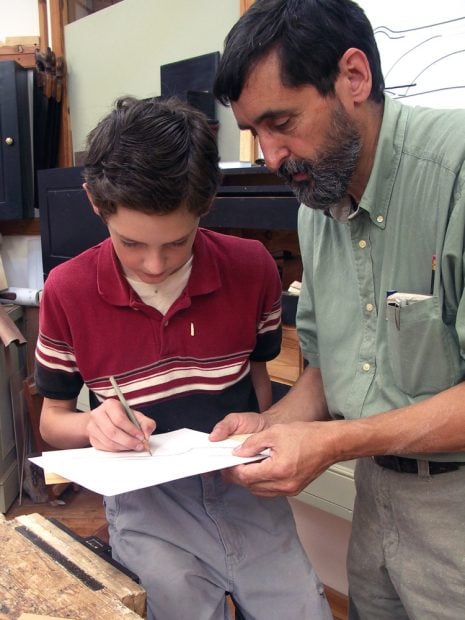
The upshot from centuries of hardwiring is we break life up into similar constituent parts where family life is distinctly separated from worklife, land life, where we work, when we work, how we work, how we rest and much, much more. Add to that the pace of our internet world, the way we interact, do business and so on, we can at least understand that there are complexities we may not understand altogether. There was a point in my life when I decided I wanted my children (4 boys) to understand and learn craft and artisanry. Not only my craft but other crafts too. To do this meant that I must see my craft as part of my life as a whole. I always had a home workshop. That meant that my children could come into the workshop with me when school was done. From that point I never really saw my work as most did where I must leave home at 7am and come home after say 6pm if the traffic lights were all green. I really haven’t travelled to and from work by car since 1980. Not until this move that is. Now I have had pockets of time when I have done so, but that totals about 1 year out of the 36.
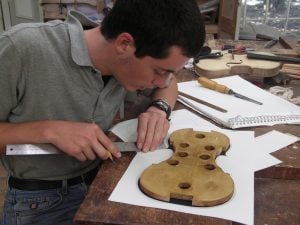
Had I to work away from home, as most people do, I would most certainly have a small and dedicated creative workspace somewhere. All too often I hear a similar cry with regards to parcelling up the day. Mostly that doesn’t work too well. My drawings and writing take place throughout the day as the need comes. when my children were at home; they are all grown now, I spent time time by having them in the shop with me. I couldn’t keep them out half the time. Mostly, because lives are indeed mostly fractured or indeed all the more fractured, people accept this as the status quo and yet most people could make changes if they wanted to. Some people say it was easy for me, but that’s far from true. No, I made the choice to work from home and have a shop to work from It was a no brainer for me,yes, but it was never easy.
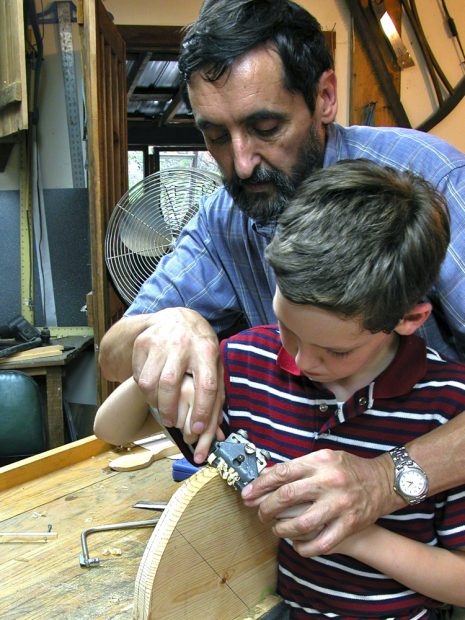
For about two decades I could work with my chickens and weed the vegetables by slipping from the workshop for half an hour when i wanted too. My wife came into the workshop and we sat and drank tea, chatted about things unimportant and important and so on. Never really knowing long commutes and traffic holdups I did start work at 7am and finished when I wanted, but mostly after 6pm.
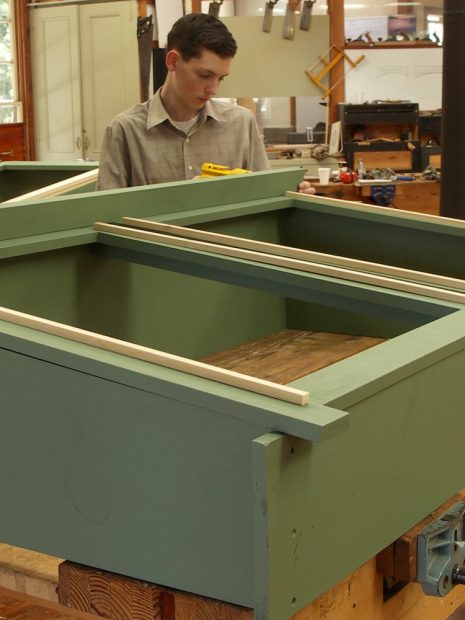
Much more productive than driving, and somehow safer too. Now I know I am fortunate. Very fortunate, but it was me that made lifestyle woodworking a choice way of life for me. I do hear constantly that you can’t make a living from woodworking, but that’s not really true. You just have to know you have trained for it, mastered sufficient skills for it, worked for it and then that that is indeed your calling. As I said, it takes a paradigm shift in the way we think and then it takes guts, and careful consideration for all those we care for because that care comes ultimately from your hands. We had one wage earner in the house but we both worked to make the business work.


I’ll be 69 years old next month and reading Paul has shown me that I missed the boat. I should have just gone ahead and done it, and ditched the excess.
So, I found a little dingy, with oars, and I’m going to try to jump aboard, and anything excess, if I’m successful for some of the few years I have left, it will be because I jettisoned anything that rocked the boat.
Insofar as my wife is concerned, I just may have to “suggest” plenty of things for her to keep herself busy and happy.
I know for me, after having getting married and shortly after starting a family, my free time because very little. To help me do the things I really wanted, I pretty much stopped watching TV. I’ve also been working hard to spend less time on the internet. This has helped me spend more time on my hobbies. Similar to Paul (though not by design), there are two boxes of toys that my 4 year old can play with. This keeps her happy and my wife happy as she then has some free time. My daughter also likes the “wooden teeth” that come from the byproduct of wood working. I really like it when she pulls up a chair to watch and ask questions. I like I’m working with handtools and there is a greater safety factor for her (and me). If I had power tools going, I’m not sure I would want her in the workshop (immediate danger plus I wouldn’t want her to learn how to turn on power tools).
I know a good number of woodworkers who are very interested in pursuing woodworking as a way of making a living. But they all have a day time job to keep them afloat and the side business in woodworking doesn’t make them financially independent no matter how they see it or cut it. If you can find a woodworking business that hires someone to build furniture, that may be a better first step to see how the real world works.
Make the sacrifice. Quit your day job and put all your energy into woodworking. “Never half ass two things only whole ass one”. You may be broke for a while but it’s worth a shot. Day jobs are a dime a dozen.
I understand the sentiment but when the bills are near and there’s no reserve in the bank it takes a bit more planning than cavalierly striding out into unknown horizons. Having skill and ability, a sense of direction and then some willing customers or some sales to support you really helps you in the opening weeks.
In my early 40s someone close to me my age died. It was a shocker. I enjoy what I do at work and it pays very well but I won’t say I’m passionate about it. Similar to what Paul said, I had responsibilities and obligations that wouldn’t allow me to radically change career paths. I made a plan that by my mid-50s I would have options so that if I wanted a career change (duration was semi arbitrary as I wasn’t in a rush to change things). To gain exposure (in case I want clients down the road if I go into wood working as a career), I’m planning to donate pieces to my daughters school for their annual fund raising auction. It will allow folks who kind of know me to see my talents. This year I will make the tool caddy and the wall clock. As my skill increases so will be what I donate. The other thing I plan to do is make half a dozen pieces of things that are appropriate for my skills and get a booth at the local city festival that happens a couple of times a year. If I sell some great, if not, I can use them as Christmas gifts to family. Just a thought at a way you might be able to build clients without an all or nothing approach. Good luck.
The biggest fence we hit now is the fact that everyone wants to buy stuff at the cheapest possible price.
All respect for quality has gone.
Why would anyone care if it’s made with this joint or that,if it looks good and cost less they will take that option.
Little do they know that everything sold by Oakland furniture and all the derivatives look mistletoe made up of scrap pieces of wood.
It’s a shambles,but people will buy that tripe because it’s a hell of a lot cheaper than buy something that’s hand made.
When you first start out,your name means nothing,and it’s your name that defines the price of what you sell.
It takes time to build that reputation,and trying to in this day and age is going to be hard if not futile.
My Mrs friends just spent £9000 on Oakland furniture stuff,when I saw it I had to hold back from saying,are you insane.
I said would you have paid me to .ale that,and they said no because they can trust big companies,if there was a problem it would have been troublesome for us to rectify.
I don’t understand it,but I know one thing is for sure,no one cares how it’s made,all they care about is price.
Good luck to everyone trying to beat these massive compainies.
Patchedupdemon, if someone has just paid £9,000 for furniture in a store that’s proof that they will pay for furniture as long as it’s in the style they like. To ‘convert’ a potential customer into trusting an individual to make the furniture you have to overcome the barriers to purchasing. If they’re concerned about issues not being rectified then it’s testimonials and word of mouth. Also to be able to see what you will get before buying it it’s a huge element. Walking around a shop floor and opening and closing cupboards and being able to discuss the furniture that you see before you overcomes those barriers. For the crafting artisan you have to be able to overcome them one way or another. But people will pay.
Your comments are very true. It does make you wonder where the heck we will be in the next few generations, doesen it
The original question mentioned “I feel I have found what I am called to do in my life of work and that is to create and build” – the question is; what?
I suspect it would be feasible to quit your job and start work as a general handyman, but to create (for example) furniture of a level of class that would command good prices would, I suspect, be difficult. Even if you’re talented you need to find a market – and as other posters have already noted, the general public won’t have the ability to “read” the quality of an item and understand why a hand crafted piece costs what it does.
Assuming it were possible to make enough compromises in your current life for a short time; it may make sense to dip a toe in the water: create a few pieces and see if you can sell (to see if the full jump may be realistic).
I’m not trying to be negative, but from business to sport to music, the reality is that we hear about the minority of success stories; as opposed to the majority of people that didn’t make it work. A bit of perspective and reality is required.
In this day in age we live in a throw away world, people have become drawn into the big manufacturers hands, they are happy to go in store buy cheap or poorly made furniture then in a couple of years replace it. I make kitchens for a living and its the same, I make solid wood kitchens but my customers are a select few that understand and appreciate quality. Most kitchens now are poorly made from chipboard or mdf rubbish, even big designer company’s are the same. But most are affordable to the average Joe and they don’t know what they are buying it just looks good to the eye. I can make kitchens off high quality for not much more than a rubbish manufactured board kitchen, but as I’ve said most don’t know the difference so choose the brand. I make less money than then big manufacturers but it takes them 30 mins to make a carcass and door by cnc that last couple of years, takes me 5/6hrs to make one that last lifetime, Big businesses want quick money and lots, we want to make quality craftsman pieces for a honest living they usually win. Then there’s the expense these cause to the planet etc, for example they illegally log timber for oak furniture etc and have it made in Asia not giving a second thought to what they are doing, china is a toxic mess in the big manufacturing city’s and towns, while paying staff peanuts. Same is happening with British steel but we live in bad times. This is not to say making furniture etc for a living can’t be done but its hard in current times, oak furniture land is all over the TV but there furniture comes at a cost. Very sad.
Like minded people to yourself are often the key. My customer base has grown by word of mouth alone because the majority of my customers look for what I can offer and actively search this out. Balancing out the income stream can be tricky initially, I worked between at least two occupations for a number of years and developed the mind and skill set in a variety of areas to enable to progress to where I wanted to go. There is much to be said for what Paul is saying regarding what I find is often referred to as ‘ balancing’ . I find it is not so much just balancing as living what you want through a successful melding of what makes our lives as we live them. This incessant need for separation of our various aspects of our lives can create barriers to our own enjoyment. If you love what you do it isn’t work as a chore or shackle around your neck. It is not always easy either. It can be hard for other people to understand or appreciate. The navigation is not always smooth. What was that saying ? “It’s not the destination, it’s all about the ride” What do you want to beat a massive company for ? Their detritus is currently up and down my street as we have a hard rubbish council collection at the moment. Most would not even be five years old, some might stretch to ten.
Having made the leap to go back and study carpentry at college, I thank the gods for the Scottish Governments approach to tuition. If I was in England or Wales I would be paying or taking a loan for education, right now I pay no tuition fees and receive a bursary. I’m in college 3 days a week, working part time 2 days a week and working for myself at the weekends. By next year I’ll be making enough from my own work to stop part time work and concentrate on setting up a business in time for finishing college the following year. Every day since last September when I stopped working full time I take a moment to remind myself how lucky I am to get the chance to start again without massive sacrifices that others have to make.
Gavin – that’s very impressive, and I wish you the best of success.
Thanks for the support, I’m really lucky to have not just found a passion in woodwork but to have the opportunity to follow it. Some people never find their niche, others find it and never get the chance to go for it. I’ve seen posts by people advocating diving into passion projects and I’m kind of on the fence. Whilst following your heart is important, having a safety net of some kind is essential. Two thirds of new businesses fail in their first few years, even when everything is done right, no amount of passion, sweat, blood and tears will guarantee beating those odds. So I agree completely with your above comments on testing the waters.
I would say that my philosophy is a bit different from the norm in the craft world, people try to emulate masters and aim for the highest they can reach. Me, I’m not competing with Paul Sellers or Wendell Castle, I’m not pushing to make £30k for masterpiece works (well not for at least another 20 years of practice at least). I’m competing with Danish flat pack factories and Asian sweatshops, I’m making affordable but lasting pieces from low cost (and sometimes free) materials. I’ve started by pricing my labour at £5 an hour/£50 a day and building up from there as I go. Again my situation is unique in that I have really minimised my living expenses to afford it and I don’t have any dependants.
I was forced to retire at 40 due to an injury, so I’ve some experience of ‘cutting my coat according to my cloth’ and something I have realised is that mostly we work to support a lifestyle needed for our Work – this house there, that car to sit in the carpark — crazy.
From what I’ve read, it’s just not possible to set up a starter business as a Cabinet-Maker — Unless you possess a very rare talent in design. No one should be trying to compete with ‘Showroom furniture’ made in Asia for criminally low wagerates. A unique product backed-up with a quality reputation will see a person survive.
Paul talked about making spoons and walking-sticks, The guys behind Gramercy Toolworks in NY. made their name and financial base on just Bench Holdfasts.
As for work/family mix – One thing i say to my wife (who has a stressful job) is that you only have a finite reserve of energy – Never give of yourself beyond what is available – people will just take whatever energy you offer. People say that what is most important is to be 100% There with your family – whatever time life allocates you. But without saving them some energy, how is that achievable?
Reality for me has always been to find balance. Usually it doesn’t come straight away but if you overwork your family will be with you and tell you to ease off. They won’t condemn you for trying. Sometimes you will need to work longer hours than those in “regular“, “real” or “proper” work but if your wife and children are like mine they will come in the workshop and sit and watch and sweep and hold things. That can be balance just as easily as taking a walk mid day or taking a day off when everything is telling you to keep working or struggling. It’s important to always listen to the ones close to you who know when you are over working or neglecting or whatever. Just as important is to stop and think through things to be fully conscious of your strengths and your weaknesses.
I think for me time will tell I would like to start wood working full time sooner than later.
I’m going to keep working my day job ( electrician ) until I have enough clientele to support my family. And on the way, my partner and I are looking at ideas of renting our house outenting somewhere for much less, I guess just ways of lowering costs so we wouldn’t need to make a certain amount of money to stay afloat. So right now it’s just a struggle of working a day job and then spending evenings and weekends in the shop. I think you have to get creative and leave your comfort zone or the “norm” and try to live your life how you want to live it. For most of us it is In our control. We just have to be willing to make change.
Ryan
Nicely written response. A loving supportive wife does make a difference in life.
Paul, I’m very curious if you read Wendell Berry. Wendell Berry’s worldview resonates deeply with me, and a lot of what you say reminds me of him. For those who are not familiar with Wendell, I can’t recommend him enough. His book, The Unsettling of America, describes what he believes was the deterioration of home life (including working at home) due to our consumer based industrialized economy. We’ve been on that trajectory for several generations now and I think it has led it to the segregation of many important aspects of human life.
I think another issue is we seem to have taken intangible values and turned them into commodities. In English, we like to say we “have work” or “have an education”, which both of these things typically require us to leave our home to obtain and carry an amount of prestige. So I think Paul is spot on when he questions whether further dividing of time is a good thing. It seems like the remedy to a busy modern life is to work towards removing the dividers. I think this requires a philosophical agreement by the entire family since it means the home becomes a thriving productive place and not just a place of consumption and play. I think using woodworking as a means to provision the home could be a good step.
I do remember reading Wendell Berry’s work from time time. He is a remarkable man. He somewhat confirmed what i already knew through my own experience of fractured life structures by which we validate and are validated. Thankfully no college or school can claim its defining of me except in the very smallest part. I left school with my headmaster telling my parents, “Paul can never be educated”. I went for my interview for an apprenticeship with my soon-to-be boss saying, “I’ve read your reports and I can’t give you the job based on them but I am giving you the job because you were here at 7am for an 8am interview. Start Monday at eight.”
This too was fractured but for me it worked because I loved work and working. I loved working with my hands. In school, when the other kids diligently studied for grades I was able to persuade my math and English teachers that the woodworking and metalworking teachers needed me. Each day I stayed under the radar. When others were trying to wrap their minds around iambic pentameters and trying for the life of them to see where they might need the use of square roots, I was melting alluminium milk bottle caps to make ingots to pour into polystyrene busts I had carved with knives I made and sharpened from industrial hacksaw blades. When I realised I needed maths and English I sat down and studied for a few hours by my bench, in my lunch breaks and whenever I needed. I know that this would not work for the mass-education of children for “the workforce” but then that’s life today. when you find yourself on the conveyor belt you have the education you need to get off it. Your choices are your choices. You can always work to disengage from the status qua, even when you are married with a family and children and payments. It’s just not quite so easy, but it’s always possible to take charge of your life.
I had a similar experience, at school I just didn’t understand the maths they said I had to learn. It wasn’t until many years later when I embarked on an electrical engineering course at college I realised the truth. I had been petrified I would be let down by my ‘poor’ maths. Turns out what they had been trying to teach me in school, I was already doing but just didn’t understand the wayvit was presented. I loved maths at college because it was applied mathematics. Ie it was solving a problem using maths. Since then I have been fortunate enough to help/coach many youngsters having ‘problems’ with school. Some of us learn different, that’s all. In a small way helping these kids gives me an insight into the feelings you have when you help all of us. Like the otherd , you have my deepest appreciation. Oh, and my £50 🙂
Thanks Paul &co.
There’s an old saying (maybe not in the western world, but I heard this elsewhere)
A craftsman may stay hungry until noon. Meaning, if you are a craftsman, you may not make a fortune but you won’t die starving. With this mindset, I think I can live happy knowing that I do what I love and clients love it too. But of course, right now I can’t talk very confidently about this, ever since Chinese manufacturers flood the market with their inexpensive products…and people these days either don’t make enough money to be able to spend it with a craftsman so they are forced to purchase inexpensive Chinese product. And there are even those who told me “with the price you gave me for my cabinets, I can buy Chinese made cabinets and replace it three times…) luckily these latter ones are only a few.
Good luck